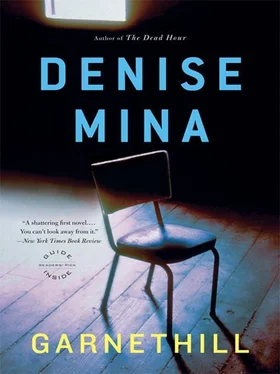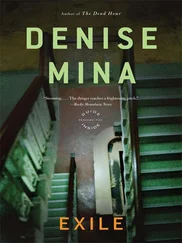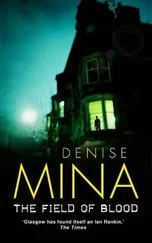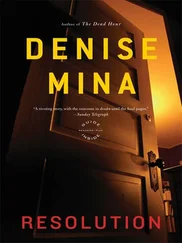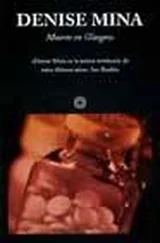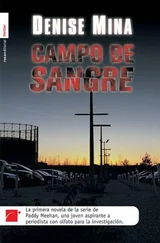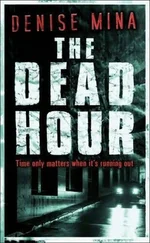"It's not bad, is it?"
"I think it's lovely," said Lynn.
"Do you know a guy called Paulsa?"
"Bad Acid Paulsa?"
"That guy who came forward for Liam."
"Yeah, I know him. We went up to his house once."
"Where does he stay?"
"You know that big Unionist pub off the Saltmarket? Next close."
"Oh, aye."
Maureen suddenly realized she had been talking about herself since they met and she'd barely asked Lynn how she was. She grinned unsteadily. "Did you and Liam get it together again, then?"
Lynn looked embarrassed. "Yeah, a wee bit. What's this Maggie character like?"
"She's all right. Not much crack, though. Are ye going out together again?"
"Naw," said Lynn, picking lumps of hair off the back of the settee. "I don't think we will be either."
"How come?"
Lynn displayed a polite reticence and then told her, "Uch, you know, Mauri, I used to look at him and all I could see was sunshine. It's not like that now. He's a bit too angry for me."
"Yeah," conceded Maureen. "He's angry enough."
Lynn punched her gently on the chin. "Like all the rest of the fucking family."
Maureen pulled her coat on. "It was good of you to come and meet me there," she said. "I think I lost the place for a wee minute."
"Happens to the best of us," said Lynn. "You stay in touch anyway, eh?"
"I will, Lynn, I will."
She walked down through the town, feeling her father's breath on her neck all the way to the shelter.
Leslie met her in the hallway. She led Maureen out of the house quickly and spoke to her on the doorstep. She couldn't come home, she said. Her shift didn't finish for another three hours. "The police came to see me again, they asked me about the night we went to that pizza place. I just told them the right times, is that okay?"
"Yeah."
"Can I pick you up at Benny's?"
"No, no," said Maureen. "I'll come back."
Leslie could see that something was wrong with Maureen: she was pale and her eyes were unfocused. "Where are you going?"
"I'll just wander about for a bit."
Leslie rubbed her arm. "Look," she said, trying to make eye contact, "urn, go to the pictures or something, all right? Don't just wander off somewhere."
"Naw, I'm all right," Maureen murmured, and toppled off the outside step, wandering away with her hands deep in the pockets of her overcoat.
They had been there for a picnic once. Benny took Maureen and Liam down there – he had played there when he was a wee boy. It was a track of waste ground by the river, looking over to Govan and the shipyards, surrounded by run-down warehouses. It was probably a dangerous place to come at night, the motorway cut it off from the town and it was dark, but Maureen was tired of caring and she had her stabbing comb in her pocket. She lifted the chicken wire, crouched down and scrambled under it. She climbed to the top of a ten-foot-high concrete wedge sticking out of the river wall and sat down. Across the water she could see into the shipyards through an open slide door. Sparks from the welders' tongs flew in slow, red arcs. She pulled her coat tight against the mean river wind and lit a fag.
It was much darker now. The tide was coming in and the river flowed backward, slapping against the wall far below her feet. She thought about the ships passing down the river many years ago, taking emigrants to America, whole families of Scots lost to their own people forever. Lost to drizzling rain and a fifty-year recession, to endemic domestic violence and armies of drunk men shouting about football.
When she climbed down the rock and straightened her coat she felt taller somehow, as if, without trying to, she had floated across the dividing line between fear and fury.
She got there just in time to meet Leslie coming off her shift. She hadn't noticed before but Leslie had been crying. The appeal committee had notified them that morning that they would not allow them to make additional submissions. In the afternoon a husband had found the address of the house, come round and convinced his wife to move back home. "He broke her pelvis last time," said Leslie. "They only took the pins out last month."
"How the fuck did he do that?"
"He beat her with a baseball bat."
"I suppose everyone'll be going home if the appeal fails," said Maureen.
"Don't even say it," muttered Leslie, and handed Maureen a crash helmet.
FRANK
Next morning Maureen adopted an English accent and phoned the Northern from Leslie's house. She asked reception to put her through to Frank in the office.
As soon as he lifted the receiver she realized that she should have thought it through beforehand. She didn't know who she was going to pretend to be, she didn't even know what story she was going to tell. She asked him whether he had seen the article about the superannuation mix-up, it was in the newsletter, he had probably read it. Well, Frank said, he remembered something about that, yes. Stunned that the story was hanging together, she staggered on: obviously it wasn't her fault, she had been called in to sort out her predecessor's mistakes, wasn't that always the way? Frank agreed vehemently. Maureen couldn't imagine Frank being called in to sort piss from shit but she didn't say so.
He agreed to get her a printout of the names and national insurance numbers of the full-time medical staff spanning ten years, from 1985 to 1995, excluding agency, and Maureen would send a courier to pick it up at two that day.
She looked at the phone before she put it down. Martin was right: Frank was really stupid.
Frank finished his sticky blueberry muffin and played another three games of Tetris. This was a bit lucky. If he did them this favor they might remember if he applied for a job at the regional office. A job in a real office. An office where you wouldn't be surrounded by bloody loonies.
At ten past two she walked into the office wearing a crash helmet and Leslie's leathers. Frank handed her a brown envelope. Curious as to how far she could push it, she made him sign a receipt for a novel she had bought a couple of weeks before. She walked down the back stairs and out of the hospital with her visor down, feeling untouchable, like a movie hero. Leslie had kept the engine running and the stand up on the bike. Maureen swung her leg over the seat and Leslie turned, spraying gray gravel. The lights farther down the road changed, causing a break in the traffic, and they pulled out into the road.
Back in the Drum they broke open a quarter bottle of whisky, took a slug each and opened the envelope. Frank had printed out a single sheet from his files, all medical personnel employed at the Northern covering the years 1985 to 1995, excluding agency. It was a list of national insurance numbers. No names. Frank really was a stupid bastard.
As they finished the whisky Leslie showed her how to sharpen the end of the stabbing comb into a point. She drew the long handle of the comb across a black wedge of silicon carbide, backward and forward, turning it over at the end to sharpen both sides, dragging it on the diagonal to give it an edge. She wrapped a J-cloth over the teeth and gave it to Maureen to have a go. She scratched the handle over the block, turning it over and drawing it through. She kept going until she brought it to a neat point with an inch-long sharpened ledge on either side of the tip. Leslie rubbed margarine into it to disguise the scratches.
Maureen thought about the stabbing comb as Leslie drove her back to Maryhill and Benny's house, she thought about it and it warmed her, as the remembrance of a great love would.
Leslie dropped her at the bollards in the Maryhill Road.
Benny was in the hall, on his way out to the library. "Maureen, where were you yesterday?" he said, and hugged her. "How're ye keeping?"
Читать дальше
